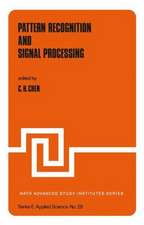Symmetries and Groups in Signal Processing: An Introduction: Signals and Communication Technology
Autor Virendra P. Sinhaen Limba Engleză Paperback – 13 oct 2012
Admittedly, there is a wide selection of excellent introductory textbooks on the subject of symmetry and group theory. But they are all primarily addressed to students of the sciences and mathematics, or to students of courses in mathematics. Addressed to students with an engineering background, this book is meant to help bridge the gap.
| Toate formatele și edițiile | Preț | Express |
|---|---|---|
| Paperback (1) | 634.49 lei 6-8 săpt. | |
| SPRINGER NETHERLANDS – 13 oct 2012 | 634.49 lei 6-8 săpt. | |
| Hardback (1) | 640.55 lei 6-8 săpt. | |
| SPRINGER NETHERLANDS – 20 aug 2010 | 640.55 lei 6-8 săpt. |
Din seria Signals and Communication Technology
- 18%
 Preț: 952.89 lei
Preț: 952.89 lei - 18%
 Preț: 1559.80 lei
Preț: 1559.80 lei - 17%
 Preț: 361.80 lei
Preț: 361.80 lei - 18%
 Preț: 811.61 lei
Preț: 811.61 lei - 15%
 Preț: 585.26 lei
Preț: 585.26 lei - 18%
 Preț: 727.97 lei
Preț: 727.97 lei - 15%
 Preț: 585.90 lei
Preț: 585.90 lei -
 Preț: 393.35 lei
Preț: 393.35 lei - 20%
 Preț: 1002.73 lei
Preț: 1002.73 lei - 15%
 Preț: 641.71 lei
Preț: 641.71 lei - 20%
 Preț: 338.92 lei
Preț: 338.92 lei - 18%
 Preț: 1579.66 lei
Preț: 1579.66 lei - 18%
 Preț: 896.08 lei
Preț: 896.08 lei - 18%
 Preț: 847.11 lei
Preț: 847.11 lei - 18%
 Preț: 1234.77 lei
Preț: 1234.77 lei - 18%
 Preț: 905.54 lei
Preț: 905.54 lei - 15%
 Preț: 646.43 lei
Preț: 646.43 lei - 20%
 Preț: 662.48 lei
Preț: 662.48 lei - 15%
 Preț: 641.20 lei
Preț: 641.20 lei - 18%
 Preț: 1847.84 lei
Preț: 1847.84 lei - 18%
 Preț: 946.24 lei
Preț: 946.24 lei - 18%
 Preț: 1241.10 lei
Preț: 1241.10 lei - 20%
 Preț: 649.43 lei
Preț: 649.43 lei - 20%
 Preț: 993.28 lei
Preț: 993.28 lei - 18%
 Preț: 940.57 lei
Preț: 940.57 lei - 18%
 Preț: 1389.30 lei
Preț: 1389.30 lei - 20%
 Preț: 1003.50 lei
Preț: 1003.50 lei - 18%
 Preț: 953.52 lei
Preț: 953.52 lei - 20%
 Preț: 1001.16 lei
Preț: 1001.16 lei - 18%
 Preț: 1415.36 lei
Preț: 1415.36 lei - 15%
 Preț: 653.33 lei
Preț: 653.33 lei - 15%
 Preț: 645.60 lei
Preț: 645.60 lei - 15%
 Preț: 637.28 lei
Preț: 637.28 lei - 18%
 Preț: 948.79 lei
Preț: 948.79 lei - 18%
 Preț: 945.62 lei
Preț: 945.62 lei - 18%
 Preț: 836.36 lei
Preț: 836.36 lei - 18%
 Preț: 1225.46 lei
Preț: 1225.46 lei - 15%
 Preț: 635.01 lei
Preț: 635.01 lei - 15%
 Preț: 639.25 lei
Preț: 639.25 lei - 15%
 Preț: 646.30 lei
Preț: 646.30 lei - 15%
 Preț: 639.25 lei
Preț: 639.25 lei - 15%
 Preț: 712.36 lei
Preț: 712.36 lei - 20%
 Preț: 1006.12 lei
Preț: 1006.12 lei - 18%
 Preț: 970.56 lei
Preț: 970.56 lei
Preț: 634.49 lei
Preț vechi: 746.47 lei
-15% Nou
Puncte Express: 952
Preț estimativ în valută:
121.45€ • 131.96$ • 102.08£
121.45€ • 131.96$ • 102.08£
Carte tipărită la comandă
Livrare economică 22 aprilie-06 mai
Preluare comenzi: 021 569.72.76
Specificații
ISBN-13: 9789400733008
ISBN-10: 9400733003
Pagini: 172
Ilustrații: XII, 160 p.
Dimensiuni: 155 x 235 x 9 mm
Greutate: 0.25 kg
Ediția:2010
Editura: SPRINGER NETHERLANDS
Colecția Springer
Seria Signals and Communication Technology
Locul publicării:Dordrecht, Netherlands
ISBN-10: 9400733003
Pagini: 172
Ilustrații: XII, 160 p.
Dimensiuni: 155 x 235 x 9 mm
Greutate: 0.25 kg
Ediția:2010
Editura: SPRINGER NETHERLANDS
Colecția Springer
Seria Signals and Communication Technology
Locul publicării:Dordrecht, Netherlands
Public țintă
ResearchCuprins
Signals and Signal Spaces: A Structural Viewpoint.- Algebraic Preliminaries.- Measurement, Modeling, and Metaphors.- Symmetries, Automorphisms and Groups.- Representations of Finite Groups.- Signal Processing and Representation Theory.
Recenzii
From the reviews:
“This is an modern introduction to theoretical topics in field of signal processing, which is based on representation theory of groups. It is suitable for beginning graduate students and does not require from reader solid mathematical prerequisites. … Abstract concepts are illustrated with their concrete engineering interpretations … . this style makes the whole book very readable and suitable as textbook.” (Jaak Henno, Zentralblatt MATH, Vol. 1205, 2011)
“This is an modern introduction to theoretical topics in field of signal processing, which is based on representation theory of groups. It is suitable for beginning graduate students and does not require from reader solid mathematical prerequisites. … Abstract concepts are illustrated with their concrete engineering interpretations … . this style makes the whole book very readable and suitable as textbook.” (Jaak Henno, Zentralblatt MATH, Vol. 1205, 2011)
Textul de pe ultima copertă
Symmetries and Groups in Signal Processing: An Introduction deals with the subject of symmetry, and with its place and role in modern signal processing. In the sciences, symmetry considerations and related group theoretic techniques have had a place of central importance since the early twenties. In engineering, however, a matching recognition of their power is a relatively recent development. Despite that, the related literature, in the form of journal papers and research monographs, has grown enormously. A proper understanding of the concepts that have emerged in the process requires a mathematical background that goes beyond what is traditionally covered in an engineering undergraduate curriculum.
Admittedly, there is a wide selection of excellent introductory textbooks on the subject of symmetry and group theory. But they are all primarily addressed to students of the sciences and mathematics, or to students of courses in mathematics. Addressed to students with an engineering background, this book is meant to help bridge the gap.
Admittedly, there is a wide selection of excellent introductory textbooks on the subject of symmetry and group theory. But they are all primarily addressed to students of the sciences and mathematics, or to students of courses in mathematics. Addressed to students with an engineering background, this book is meant to help bridge the gap.
Caracteristici
Highlights the role of modern algebra in signal processing Introduces group theoretic techniques of exploiting symmetry for engineering students Explains group represenation theory with the help of examples Discusses relevance of contemporary theories of measurement and modelling Includes supplementary material: sn.pub/extras

























